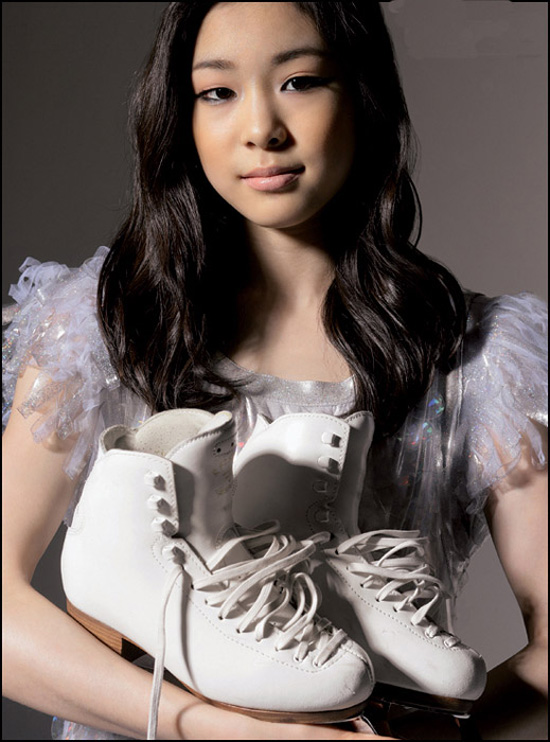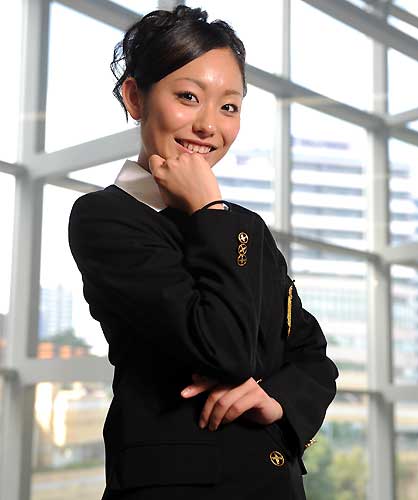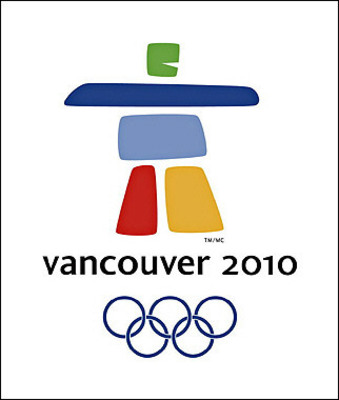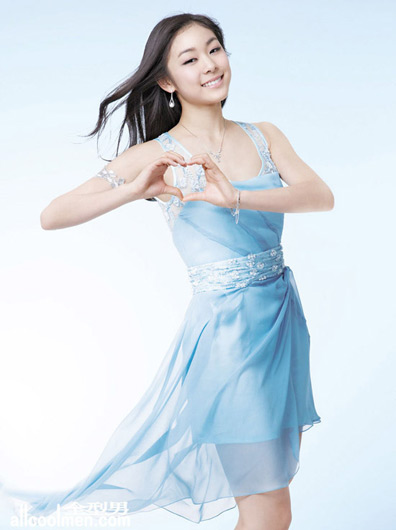gold for her to be lost
Kim Yuna has South Korea's full attention
The world figure skating champion is a superstar of huge proportions in her homeland and the favorite for the gold medal in Vancouver.
By Philip Hersh
February 11, 2010
Reporting from Toronto
Kim Yuna had boot problems.
The reigning world figure skating champion took the ice for her morning practice at the Toronto Cricket Skating & Curling Club, skated a few minutes, then limped off. Kim removed her right skate and gave it to her mother, Park Mee-Hee, who had been watching from beyond a glass wall that separates the club's lounge from the rink.
This unremarkable episode two months before the Winter Olympics would have been headline news in South Korea, where three TV networks had shown her arrival at a November Grand Prix event in Lake Placid, N.Y., then run endless loops of her fall on a triple loop jump in . . . practice.
Kim's mother pulled out a set of tools and began adjusting the blade. The problem was fixed in 10 minutes, and Kim returned to the ice.
Such issues are so common for elite skaters, whose jumping and spinning puts intense pressure on boots and blades, they merit little attention unless they occur the week of a competition.
But everything Kim does is a big deal in South Korea, where a newspaper has named her the country's "person of the year" the last two years and respondents to a Gallup poll have chosen her as South Korea's top athlete the last three years.
So it is no coincidence that Kim has attained that stature and become the Olympic gold-medal favorite as a skating emigre.
"I can't really focus on my skating in Korea because the media and everyone is watching me," she said.
She has trained in Toronto since 2006, finding comfort in the club's atmosphere of British exclusivity, what with its namesake activities and lawn bowling greens and croquet courts and $18,000 senior members' initiation fee. The protection against constant scrutiny from South Korean media that comes with such surroundings is a big part of its appeal for Kim.
"I'm not used to this type of circus," Brian Orser said. "Even in 1988, it wasn't as big as this."
In 1988, the only other time the Winter Olympics were in Canada, Orser was the country's best hope for a gold medal. He won a silver, and Canada got no gold, making Orser want to apologize to the country.
Now he is Kim's coach, the one about whom South Korean newspapers have written, "Coach Orser is the savior." Said Kim's agent, Michelle Ha: "Brian is the most popular foreigner in Korea."
In four seasons with Orser, Kim, 19, has become far more than the first Korean figure skater of any renown. She is a superstar of such proportions that Seoul street caricaturists trying to lure customers display her image to show their skill.
No figure skater ever has been more celebrated in her home country than Kim is.
"I don't really know why [the Korean people] love me," Kim said. "Maybe it's because figure skating isn't just about who won, it's also artistic.
"People don't just see me when I am figure skating. They also watch the sport and the performance."
Kim's mother struggles with the idea that her daughter is the person whose face is everywhere in South Korea.
"The Yuna I know is the Yuna during training and competition, and that image of her stays with me," Park said. "I can't feel the superstar Yuna with my skin."
As an endorser for Samsung, LG, Hyundai, KB Kookmin Bank (South Korea's national bank), Nike and Korean Air, as well as several other smaller companies, Kim earns a reported $9 million a year. She recently gave $100,000 to a Haiti relief fund, previously had donated $100,000 to buy school uniforms for needy Korean schoolchildren, and she pays for the Korean federation's junior skating program.
Using what it called the "Kim Yuna marketing strategy," Samsung's "Yuna Haptic" mobile phone sold a local record 1 million units in the first seven months after its introduction last May.
It seems a long way from the days when her mother worried about finding the $43 a month for 7-year-old Kim to have private skating lessons near their home in Gunpo.
On her flight to visit Seoul last month as a U.S. public diplomacy envoy, skating legend Michelle Kwan found out what Kim means to her country while talking to a Korean passenger.
"The man told me, 'Yuna is the nation's daughter,' " Kwan said. "We have our Michael Jordans and Michael Phelps and other superstars, but we don't consider them the country's sons or daughters."
There is another dimension to Kim's popularity in Korea, one that has touched off bitter debate on the Internet, where discussions of Kim's technique and personality and those of main rivals Mao Asada and Miki Ando of Japan often are laced with nationalistic vitriol.
Ando won the world title in 2007, Asada in 2008. Shizuka Arakawa of Japan, now retired from competition, is the reigning Olympic champion.
If Kim wins gold, she also will defeat the Japanese.
"Anything that involves Korea and Japan carries with it the emotional baggage of the past history between these neighbors," said Daniel Sneider, associate director for research at Stanford's Shorenstein Asia-Pacific Research Center. "In the Korean mind, it is a history of Japanese invasion and occupation going back to the 16th century, which makes sports competition more than just about sports. To beat the Japanese in anything has an importance in terms of pride.
"She [Kim] can't be ignorant of the fact she has the weight of a nation and the weight of the past on her shoulders."
They are slim shoulders, atop a willowy body that seemed especially ethereal in the black tights and sweater Kim wore to practice. Her strength is concealed, as is a mental toughness Orser once wondered about.
"She knows when to turn it on and off," he said.
In 1992, Japanese skater Midori Ito apologized to her country for winning just silver in the Olympics. Kim cannot understand why she would have to say "I'm sorry" to Korea if she does not win gold in Vancouver.
"Competing or winning competitions, it's not for my country, it's for me," Kim said. "I'm doing it for myself, not to win awards for Koreans. I am not skating just to win gold. I am skating for skating."
She was little more than a jumper when her mother brought Kim to Toronto in 2006 to work on artistry with David Wilson, who has become her choreographer. Wilson asked Orser to help Kim on some technique issues, and her mother liked them both so much she asked Orser to coach her.
Since then, her mother has lived in Toronto with Kim. Her father and older sister live in South Korea.
In 2006, the 15-year-old Kim was battling a persistent knee injury and was so frustrated with the demands of the sport she told a Korean newspaper, "I hate skating." It would be nearly a month after her arrival, Orser said, before she smiled.
She was a gawky kid with braces. Four years later, the braces are long gone, and she is a sassy, sexy Bond girl who wears a gossamer dress for a lipstick commercial in which the voice-over says, "I love the way she fills her clothes / She looks just like them girls in Vogue."
She's done a fashion spread in the Korean edition of Vogue, as well as Elle, Men's Health and Allure. And that was nearly three years ago, when Kim's only major achievement was overcoming weeks off with a back injury to make her senior world debut and win Korea's first-ever figure skating world medal, a bronze, with what then was a record score for the short program.
Kim since has topped that score three times and also has the two highest scores for the free skate and total. She has set personal bests for all three this season. "It's almost impossible to combine athletics and artistry under the new judging system, but she seems to be able to do it," said Frank Carroll, who coached Kwan to one of her two Olympic medals and four of her five world titles.
"Yuna is very rare," Kwan said. "She has the speed, the beauty, the jumping, the footwork."
Kim looked untouchable at the 2010 Olympics until losing the free skate at Skate America to Rachael Flatt of the U.S. and short program at the Grand Prix Final to Ando three weeks later. Now she is merely a heavy favorite. "Of anyone in the whole Olympic figure skating, she is the shoo-in," Carroll said. "She would have to screw up badly to lose."
Kim figured she took some pressure off herself with the flawed performances in her last two competitions. "I think in Korea, now they know I couldn't skate perfect every time," she said.
Maybe. What they really know is Kim can live up to the mythological roots of her family name.
It means gold.









































































